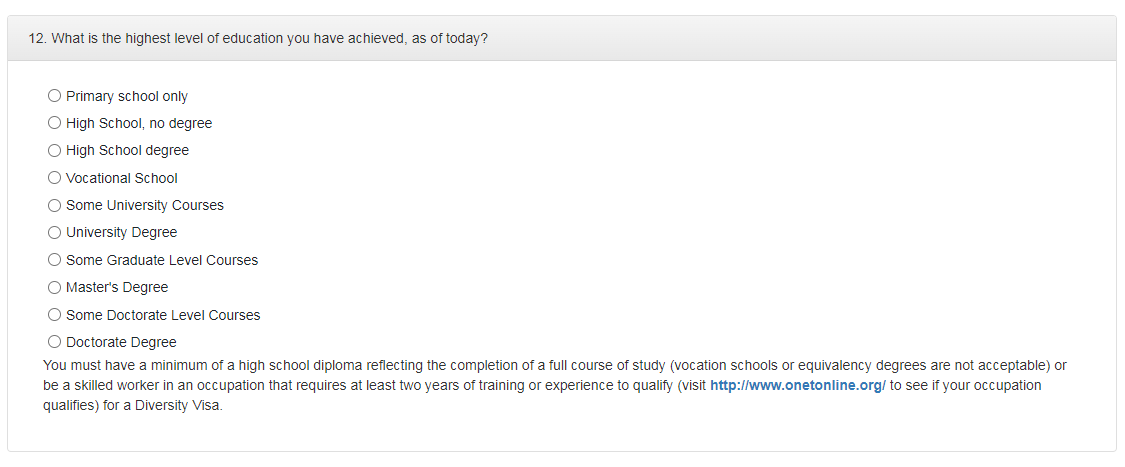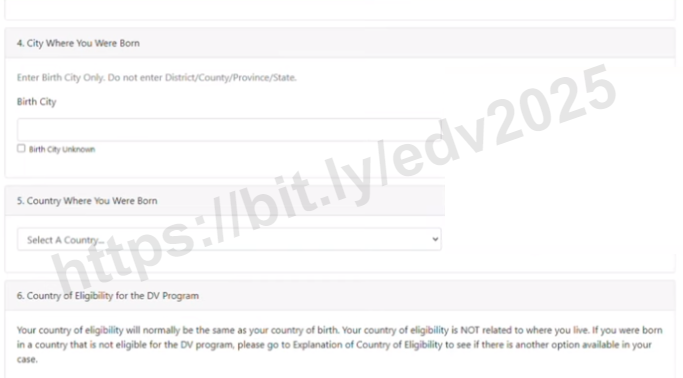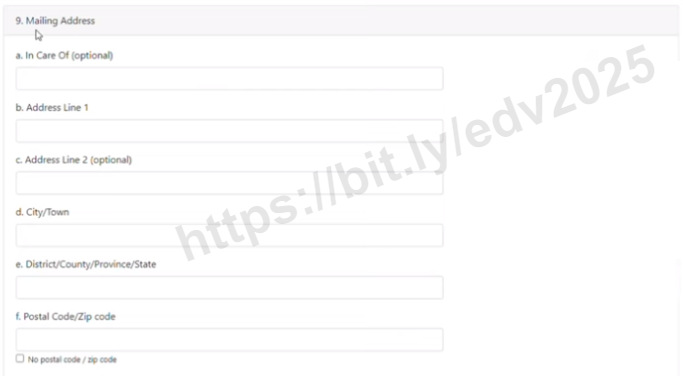DV-2025 Lottery FAQs: This post will focus mainly on some very important frequently asked questions about Diversity Visa (DV) lottery program.
DV-2025 Lottery FAQs: Answers to Your Most Common Questions
Question: Can I still apply if I was not born in a qualifying country?
Answer: There are two circumstances in which you still might be eligible to apply. First, if your derivative spouse was born in an eligible country, you may claim chargeability to that country. As your eligibility is based on your spouse, you will only be issued an immigrant visa if your spouse is also eligible for and issued an immigrant visa. Both of you must enter the United States together, using your DVs.
Similarly, your minor dependent child can be “charged” to a parent’s country of birth.
Second, you can be “charged” to the country of birth of either of your parents as long as neither of your parents was born in or a resident of your country of birth at the time of your birth.
People are not generally considered residents of a country in which they were not born or legally naturalized. For example, persons simply visiting, studying, or temporarily working in a country are not generally considered residents.
If you claim alternate chargeability through either of the above, you must provide an explanation on the E-DV Entry Form.
Listing an incorrect country of eligibility or chargeability (i.e., one to which you cannot establish a valid claim) will make you ineligible for a DV.
Question: Why do natives of certain countries not qualify for the DV program?
Answer: DVs are intended to provide an immigration opportunity for persons who are not from “high admission” countries. U.S. law defines “high admission countries” as those from which a total of 50,000 persons in the Family-Sponsored and Employment-Based visa categories immigrated to the United States during the previous five years.
Each year, the Department of Homeland Security (DHS) counts the family and employment immigrant admission and adjustment of status numbers for the previous five years to identify the countries that are considered “high admission” and whose natives will therefore be ineligible for the annual Diversity Visa program.
Since DHS makes this calculation annually, the list of countries whose natives are eligible or not eligible may change from one year to the next.
Question: Is there a minimum age to apply for the E-DV Program?
Answer: There is no minimum age to apply, but the requirement of a high school education or work experience for each principal applicant at the time of application will effectively disqualify most persons who are under age 18.
Question: I am in the United States. Can I enter the DV program?
Answer: Yes, an entrant may apply while in the United States or another country. An entrant may submit an entry from any location.
Question: Can I only enter once during the registration period?
Answer: Yes, the law allows only one entry per person during each registration period. The Department of State uses sophisticated technology to detect multiple entries. Individuals with more than one entry will be ineligible for a DV.
Question: May my spouse and I each submit a separate entry?
Answer: Yes, each spouse may each submit one entry if each meets the eligibility requirements. If either spouse is selected, the other is entitled to apply as a derivative dependent.
Question: Which family members must I include in my DV entry?
Answer:
Spouse: If you are legally married, you must list your spouse regardless of whether they live with you or intend to immigrate to the United States. You must list your spouse even if you currently are separated from them unless you are legally separated. Legal separation is an arrangement when a couple remains married but lives apart, following a court order.
If you and your spouse are legally separated, your spouse will not be able to immigrate with you through the Diversity Visa program. You will not be penalized if you choose to enter the name of a spouse from whom you are legally separated.
If you are not legally separated by a court order, you must include your spouse even if you plan to be divorced before you apply for the Diversity Visa, or your spouse does not intend to immigrate.
Failure to list your eligible spouse or listing someone who is not your spouse will make you ineligible for a DV.
If you are not married at the time of entry but plan on getting married in the future, do not list a spouse on your entry form, as this would make you ineligible for a DV. If you are divorced or your spouse is deceased, you do not have to list your former spouse.
The only exception to this requirement is if your spouse is already a U.S. citizen or U.S. Lawful Permanent Resident. If your spouse is a U.S. citizen or Lawful Permanent Resident, do not list them in your entry.
A spouse who is already a U.S. citizen or a Lawful Permanent Resident will not require or be issued a DV.
Therefore, if you select “married and my spouse IS a U.S. citizen or U.S. LPR” on your entry, you will not be able to include further information on your spouse.
Children: You must list ALL your living children who are unmarried and under 21 years of age at the time of your initial DV entry, whether they are your natural children, your stepchildren (even if you are now divorced from that child’s parent), your spouse’s children, or children you have formally adopted in accordance with the applicable laws.
List all children under 21 years of age at the time of your electronic entry, even if they no longer reside with you or you do not intend for them to immigrate under the DV program.
You are not required to list children who are already U.S. citizens or Lawful Permanent Residents, though you will not be penalized if you do include them. Parents and siblings of the entrant are ineligible to receive DV visas as dependents, and you should not include them in your entry.
If you list family members on your entry, they are not required to apply for a visa or to immigrate or travel with you. However, if you fail to include an eligible dependent on your original entry or list someone who is not your dependent, you may be ineligible for a DV, in which case your spouse and children will be ineligible for derivative DVs. This only applies to those who were family members at the time the entry was submitted, not those acquired at a later date.
Your spouse, if eligible to enter, may still submit a separate entry even though they are listed on your entry, and both entries must include details about all dependents in your family.
Question: Must I submit my own entry, or can someone else do it for me?
Answer: Interested applicants are encourage to prepare and submit their own entry, but you may have someone submit the entry for you. Regardless of whether you submit your own entry, or an attorney, friend, relative, or someone else submits it on your behalf, only one entry may be submitted in your name.
You, as the entrant, are responsible for ensuring that information in the entry is correct and complete; entries that are not correct or complete may be disqualified. Entrants should keep their confirmation number, so they are able to check the status of their entry independently, using Entrant Status Check at dvprogram.state.gov. Entrants should retain access to the email account used in the E-DV submission.
Question: I’m already registered for an immigrant visa in another category. Can I still apply for the DV program?
Answer: Yes.
Question: Can I download and save the E-DV entry form into a word processing program and finish it later?
Answer: No, you will not be able to save the form into another program for completion and submission later. The E-DV Entry Form is a web-form only. You must fill in the information and submit it while online.
Question: Can I save the form online and finish it later?
Answer: No. The E-DV Entry Form is designed to be completed and submitted at one time. You will have 60 minutes, starting from when you download the form, to complete and submit your entry through the EDV website.
If you exceed the 60-minute limit and have not submitted your complete entry electronically, the system discards any information already entered. The system deletes any partial entries so that they are not accidentally identified as duplicates of a later, complete entry.
Read the DV instructions completely before you start to complete the form online so that you know exactly what information you will need.
Question: I don’t have a scanner. Can I send photographs to someone else to scan them, save them, and email them back to me so I can use them in my entry?
Answer: Yes, as long as the photograph meets the requirements in the instructions and is electronically submitted with, and at the same time as, the E-DV online entry. You must already have the scanned photograph file when you submit the entry online; it cannot be submitted separately from the online application.
The entire entry (photograph and application together) can be submitted electronically from the United States or from overseas.
Question: If the E-DV system rejects my entry, can I resubmit my entry?
Answer: Yes, you can resubmit your entry as long as your submission is completed by 12:00 pm (noon) Eastern Standard Time (EST) (GMT-5) on Tuesday, November 7, 2023. You will not be penalized for submitting a duplicate entry if the E-DV system rejects your initial entry.
Given the unpredictable nature of the Internet, you may not receive the rejection notice immediately. You can try to submit an application as many times as is necessary until a complete application is received and the confirmation notice sent. Once you receive a confirmation notice, your entry is complete, and you should NOT submit any additional entries.
Question: How soon after I submit my entry will I receive the electronic confirmation notice?
Answer: You should receive the confirmation notice immediately, including a confirmation number that you must record and keep. However, the unpredictable nature of the Internet can result in delays.
You can hit the “Submit” button as many times as is necessary until a complete application is sent and you receive the confirmation notice. However, once you receive a confirmation notice, do not resubmit your information.
Question: I hit the “Submit” button but did not receive a confirmation number. If I submit another entry, will I be disqualified?
Answer: If you did not receive a confirmation number, your entry was not recorded. You must submit another entry. It will not be counted as a duplicate. Once you receive a confirmation number, do not resubmit your information.
Checkout more DV-2025 Lottery FAQs: Answers to Your Most Common Questions.
DISCLAIMER: This post and content is designed for general information only and is NOT legal advice. This site is not offering any Diversity Visa and is not the official site for DV Lottery program. The information presented in this post should not be construed to be formal legal advice.
 Jobsscholar Jobs Search | Education Hub | Scholars Portal
Jobsscholar Jobs Search | Education Hub | Scholars Portal


